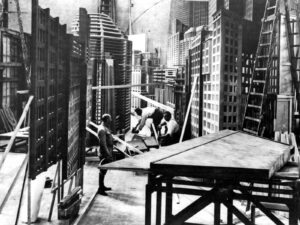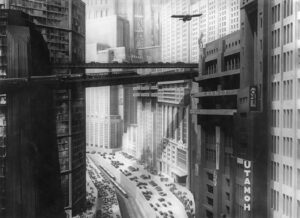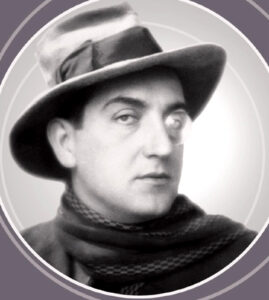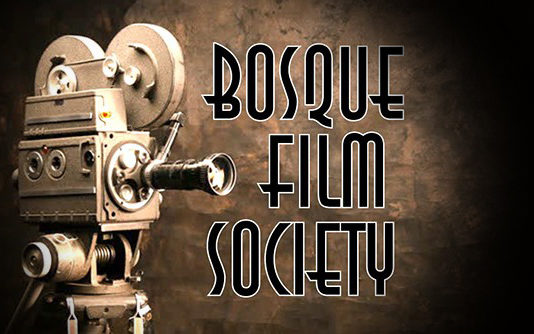Inspiring filmmakers around the world, Lang’s Metropolis set the standard by which futuristic films became visualized, judged & appreciated
By E. BRETT VOSS
Bosque Film Society Founding Board President
Kicking off its 2023 slate of classic movies for its monthly members-only FILM APPRECIATION NIGHTS, the Bosque Film Society will present Fritz Lang’s 1926 German expressionist futuristic silent film “METROPOLIS” at 6:30 p.m. Tuesday, Jan. 17 at The Cliftex Theatre in Clifton with an introductory presentation by Bosque Film Society founding board president Brett Voss.
 Considered a significant pioneering science-fiction movie as one of the first feature-length movies of that genre, Metropolis – set in the year 2026 embroiled by a futuristic urban dystopia – the populace stands divided between workers who must live in the dark underground and the rich who enjoy a futuristic city of splendor. It dramatizes the conflict between wealthy uber-capitalists and rebellious subterranean laborers orchestrated by a diabolical scientist capable of destroying them all. Encompassing the film’s primary message, the final silent film inter-title reads, “The Mediator Between the Head and the Hands Must Be the Heart.”
Considered a significant pioneering science-fiction movie as one of the first feature-length movies of that genre, Metropolis – set in the year 2026 embroiled by a futuristic urban dystopia – the populace stands divided between workers who must live in the dark underground and the rich who enjoy a futuristic city of splendor. It dramatizes the conflict between wealthy uber-capitalists and rebellious subterranean laborers orchestrated by a diabolical scientist capable of destroying them all. Encompassing the film’s primary message, the final silent film inter-title reads, “The Mediator Between the Head and the Hands Must Be the Heart.”
Visually beautiful and powerful with elaborate sets as well as lauded for its complex special effects, Metropolis laid the groundwork for sci-fi masterpieces such as 2001: A Space Odyssey and Blade Runner. Our presentation will be the premiere of Metropolis at the historic Cliftex Theatre, featuring a beautiful blu-ray edition restoring Lang’s fully-intended concept backed by a new recording of Gottfried Huppertz’s 1927 original score. Widely regarded as one of the greatest and most influential films ever made, Metropolis ranks 35th in Sight & Sound’s 2012 critics’ poll. In 2001, the film was inscribed on UNESCO’s Memory of the World Register, the first film receiving that distinction. Interestingly, the film’s U.S. copyright expired on New Year’s Day 2023, therefore entering the public domain.
With an original running time of 153 minutes, the film length came under criticism and subsequently underwent significant cuts following its premiere in Germany. Over the years, there were many attempts to restore the film to its original concept, but each of them fell short. But in 2008, a damaged print of Lang’s original cut was found in an Argentina museum. The Blu-ray restoration opens with an explanation: “The material was heavily damaged and, because it had been printed on 16mm film stock, does not have the full-aperture silent picture ratio. In order to maintain the scale of the restored footage, the missing portion of the frame appears black. Black frames indicate points at which footage is still lost.” After a long restoration process that required additional materials provided by a print from New Zealand, the film was 95 percent restored and shown on large screens in Berlin and Frankfurt simultaneously on Feb. 12, 2010.
Metropolis features a range of elaborate special effects and set designs, ranging from a huge gothic cathedral to a futuristic cityscape. In an interview, Lang reported that “the film was born from my first sight of the skyscrapers in New York in October 1924.” The Art Deco movement heavily influenced the appearance of the city in Metropolis, but it also incorporates elements from other traditions, becoming somewhat eclectic, representing both functionalist modernisms, as well as the scientist’s archaic little house with its high-powered laboratory, the catacombs and the Gothic cathedral.
 Drawing heavily on biblical sources for several of its key set-pieces. During Maria’s first talk to the workers, she uses the story of the Tower of Babel to highlight the discord between the intellectuals and the workers. It’s also important to consider the context of the film as much of the plot line of Metropolis stems from the World War I and the culture of the Weimar Republic in Germany. Lang explores the themes of industrialization and mass production in his film – two developments that played a large role in the war. Lang also includes the Weimar view of American modernity, fascism and communism.
Drawing heavily on biblical sources for several of its key set-pieces. During Maria’s first talk to the workers, she uses the story of the Tower of Babel to highlight the discord between the intellectuals and the workers. It’s also important to consider the context of the film as much of the plot line of Metropolis stems from the World War I and the culture of the Weimar Republic in Germany. Lang explores the themes of industrialization and mass production in his film – two developments that played a large role in the war. Lang also includes the Weimar view of American modernity, fascism and communism.
Shooting of the film was a draining experience for the actors involved due to the demands that Lang placed on them. For the scene where the workers’ city was flooded, Helm and 500 children from the poorest districts of Berlin had to work for 14 days in a pool of water that Lang intentionally kept at a low temperature. Lang would frequently demand numerous re-takes, and took two days to shoot a simple scene where Freder collapses at Maria’s feet. By the time Lang was satisfied with the footage he had shot, actor Gustav Fröhlich found he could barely stand.
Other anecdotes involve Lang’s insistence on using real fire for the climactic scene where the false Maria is burnt at the stake which resulted in Helm’s dress catching fire, and his ordering extras to throw themselves towards powerful jets of water when filming the flooding of the workers’ city.
 Special effects expert Eugen Schüfftan created pioneering visual effects for Metropolis, specifically the use of miniatures for the city, a camera on a swing, and most notably, the Schüfftan process, in which mirrors are used to create the illusion that actors are occupying miniature sets. Alfred Hitchcock utilized this new technique again just two years later in the film Blackmail (1929).
Special effects expert Eugen Schüfftan created pioneering visual effects for Metropolis, specifically the use of miniatures for the city, a camera on a swing, and most notably, the Schüfftan process, in which mirrors are used to create the illusion that actors are occupying miniature sets. Alfred Hitchcock utilized this new technique again just two years later in the film Blackmail (1929).
Shooting lasted 17 months, with 310 shooting days and 60 shooting nights, and was finally completed on Oct. 26, 1926. By the time shooting finished, the film’s budget leapt to 5.3 million Reichsmarks, the equivalent of $2.12 million at the time (approximately $35 million today), over three and a half times the original budget.
Despite the film’s later reputation, some contemporary critics panned it. Critic Mordaunt Hall of The New York Times called it a “technical marvel with feet of clay.” In The New Yorker, Oliver Claxton called Metropolis “unconvincing and overlong,” faulting much of the plot as “laid on with a terrible Teutonic heaviness, and an unnecessary amount of philosophizing in the beginning” that made the film “as soulless as the city of its tale.”
On the flip side, Nazi propagandist Joseph Goebbels stood impressed with the film’s message of social justice. Shortly after the Nazis came to power, Goebbels told Lang that, on the basis of their seeing Metropolis together years before, Adolf Hitler had said that he wanted Lang to make Nazi films. Consequently, Lang later moved to the United States to escape the Nazis and developed a distaste for the film stemming from the Nazi Party’s fascination with it.
 According to Roger Ebert, “Metropolis is one of the great achievements of the silent era, a work so audacious in its vision and so angry in its message that it is, if anything, more powerful today than when it was made.” Leonard Maltin’s Movie Guide’s entry on the film reads, “Heavy going at times, but startling set design and special effects command attention throughout.”
According to Roger Ebert, “Metropolis is one of the great achievements of the silent era, a work so audacious in its vision and so angry in its message that it is, if anything, more powerful today than when it was made.” Leonard Maltin’s Movie Guide’s entry on the film reads, “Heavy going at times, but startling set design and special effects command attention throughout.”
Every month, the Bosque Film Society hosts its members-only FILM APPRECIATION NIGHT featuring classic films chosen by its members every December. In 2023, the featured showings will be Metropolis (1927) Jan. 17; Singing In The Rain (1952) Feb. 14; North By Northwest (1959) March 14; Wizard of Oz (1939) April 11; Casablanca (1942) May 16; The Big Lebowski (1998) June 13; Gone With the Wind (1939) July 11; Amadeus (1984) Aug. 8; Lawrence of Arabia (1962) Sept. 12; Rocky Horror Picture Show (1975) Oct. 24; Stagecoach (1939) Nov. 14; 4th Annual Christmas Party (film to be determined) Dec.12.
Since this will be a private showing, BYOB will be allowed, and the theatre concession stand will be open for purchases. The Bosque Film Society will provide free wine and beer to its members, while supplies last. Although the event will be closed to the public, those wishing to become Bosque Film Society members Tuesday night will be admitted.
For more information about joining the Bosque Film Society’s non-profit efforts to support The Cliftex Theatre, the longest continuously-operating movie house in Texas, showing films since 1916, visit our website at: www.bosquefilm.com.
